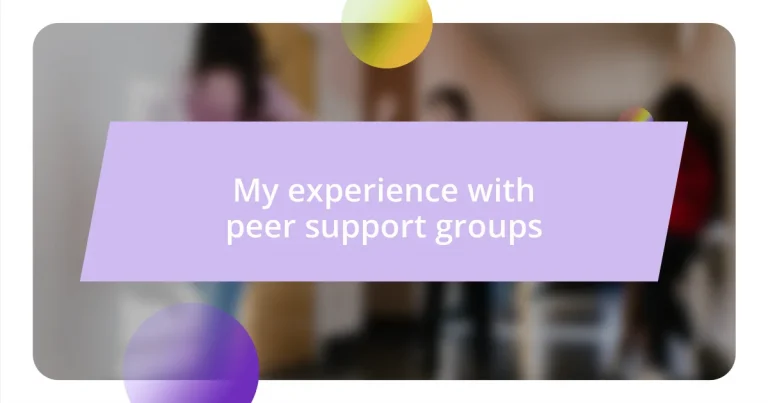Key takeaways:
- Peer support groups create a sense of community through shared experiences, providing emotional support and practical advice.
- Finding the right group involves aligning values and fostering an open atmosphere that encourages vulnerability.
- Effective participation requires active listening, setting personal goals, and addressing challenges to build trust and connection.
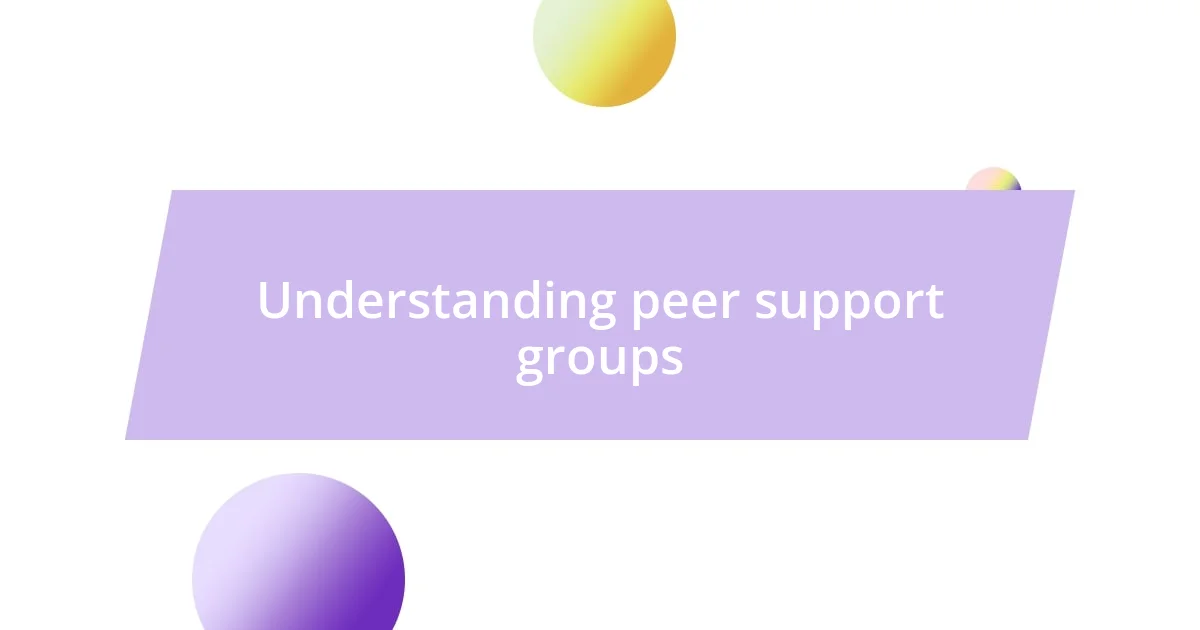
Understanding peer support groups
Peer support groups are unique spaces where individuals connect over shared experiences, fostering a sense of belonging and understanding. I remember attending my first meeting; I was filled with trepidation but found comfort in knowing others had walked similar paths. How often do we feel isolated in our struggles, yet here was a room full of people ready to listen and share?
These groups not only provide emotional support but also invaluable practical guidance. Participants often exchange tips and coping strategies, creating a rich tapestry of resources that one might not find elsewhere. I was amazed at how a simple suggestion from a fellow member turned into a powerful tool during my challenging times. Have you ever found wisdom in unexpected places?
What truly sets peer support groups apart is their emphasis on equality. Unlike traditional therapy settings, everyone’s voice holds the same weight, which helps break down barriers. In my experience, the vulnerability displayed in sharing personal stories created an atmosphere of trust that felt so liberating. It makes you wonder: could such an open exchange lead to deeper personal growth than we initially anticipate?
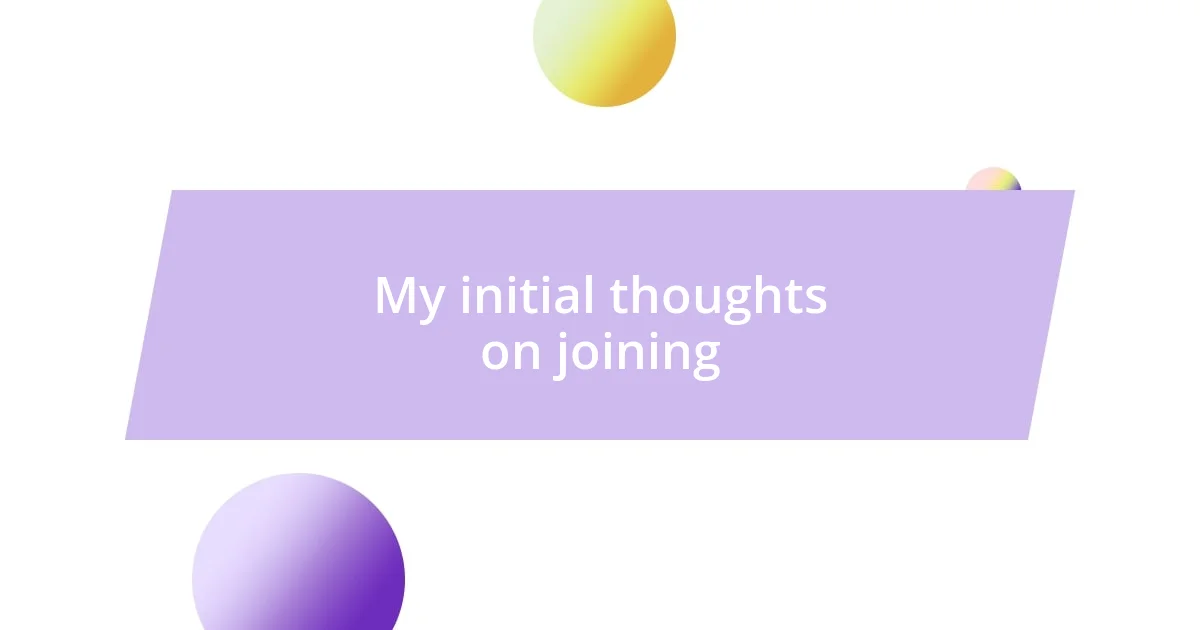
My initial thoughts on joining
Walking into my first peer support group, I was a mix of excitement and nerves. I had so many questions swirling in my head: Would I fit in? Would I find the support I desperately needed? It felt like standing at the edge of a diving board, peering into a pool of uncertainty. But as I settled in, listening to others share their journeys, I realized that I wasn’t alone. It was a little like stepping into a family gathering where everyone knows the unspoken struggles, yet still offers warmth and understanding.
- The atmosphere was charged with empathy, almost palpable.
- I noticed how quickly the initial awkwardness faded; we were all there for similar reasons.
- Listening to others share made me reflect on my own experiences in ways I hadn’t considered before.
- I felt a gradual release of the pressure I had been carrying alone.
Suddenly, sharing my own story didn’t feel as daunting. It was liberating, really.
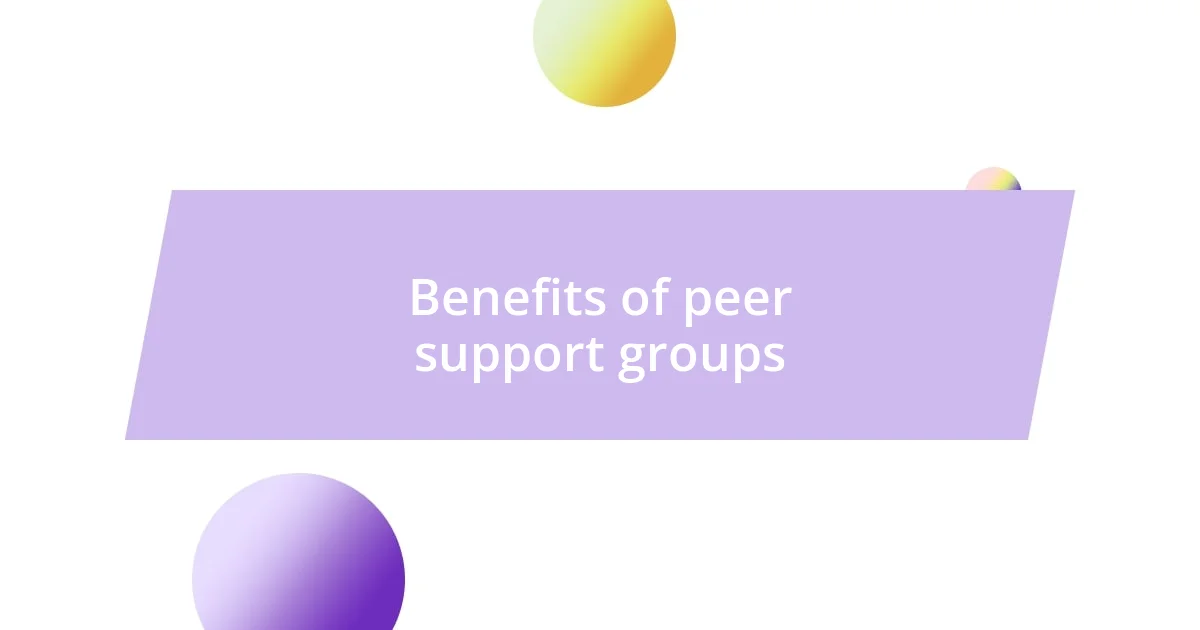
Benefits of peer support groups
Finding connection in peer support groups brings a wealth of benefits that many of us can genuinely appreciate. In my experience, one of the most significant advantages is the feeling of community. There’s an undeniable sense of comfort in knowing that everyone in the room has faced their own struggles. I remember the first time I heard someone articulate what I’d been feeling for months; it was like a light bulb flicked on. Hasn’t there been a moment when someone else’s words felt like they were speaking directly to your heart?
Another key benefit is the practical advice shared within these groups. I often found that members offered unique perspectives that I had never considered. For instance, someone once mentioned a specific mindfulness technique that helped them cope with anxiety. I decided to try it, and it became a game-changer for me. It’s fascinating how collective wisdom often feels more impactful than advice from a textbook, wouldn’t you agree?
Finally, the mutual respect for each individual’s journey fosters a sense of validation. When I shared my story, I felt seen, heard, and understood in a way that was so refreshing. It’s a powerful reminder that our experiences, while unique, resonate deeply with others. Each time I stepped into a meeting, I felt more empowered to share my truth, and in doing so, I discovered layers of resilience I didn’t know were there.
| Benefit | Description |
|---|---|
| Community Connection | Participants find comfort in shared experiences, fostering relationships built on understanding. |
| Practical Advice | Members share coping strategies and insightful tips that often lead to new solutions for personal challenges. |
| Mutual Respect | Personal stories are met with validation, empowering individuals to be open and honest about their journeys. |
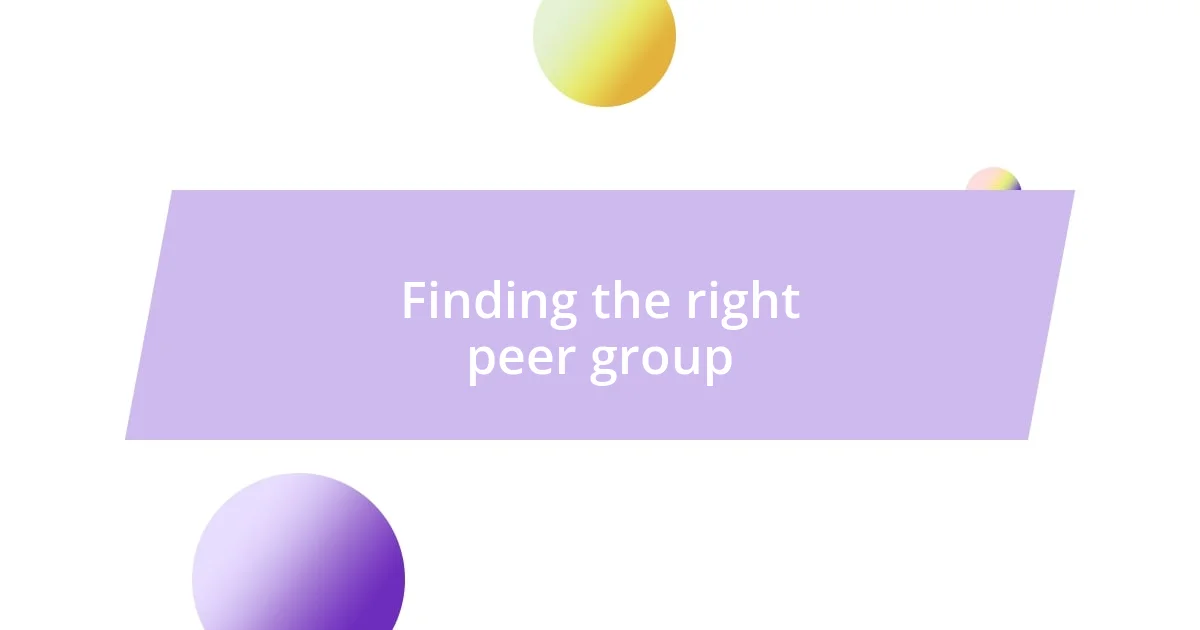
Finding the right peer group
Finding the right peer group can sometimes feel like searching for a needle in a haystack, but it’s worth the effort. I remember shifting between various groups until I finally found one that resonated with me. It was as if I had stumbled upon a treasure chest—the warmth, understanding, and shared experiences made it feel like home. Have you ever felt that spark of connection where everything just clicks? That’s the magic of finding the right group.
In my experience, the atmosphere of a peer support group plays a crucial role. I attended one where the energy felt heavy, stifling any openness, and I left feeling more drained than uplifted. Conversely, in a group where laughter and light-heartedness mingled with serious discussions, I found myself blooming. That environment encouraged me to share vulnerably and embrace the stories of others. Isn’t it incredible how a simple change in atmosphere can make such a significant difference?
Moreover, I found that aligning values with the group was essential for genuine connection. I once joined a group that focused heavily on problem-solving without allowing space for emotional expressions. While the strategies shared were useful, I craved the emotional validation that came from shared vulnerability. It taught me to trust my instincts about what I needed in a support group, emphasizing the importance of finding somewhere that felt affirming. Are you seeking emotional resonance or practical strategies? Knowing what you need is the first step in finding your fit.
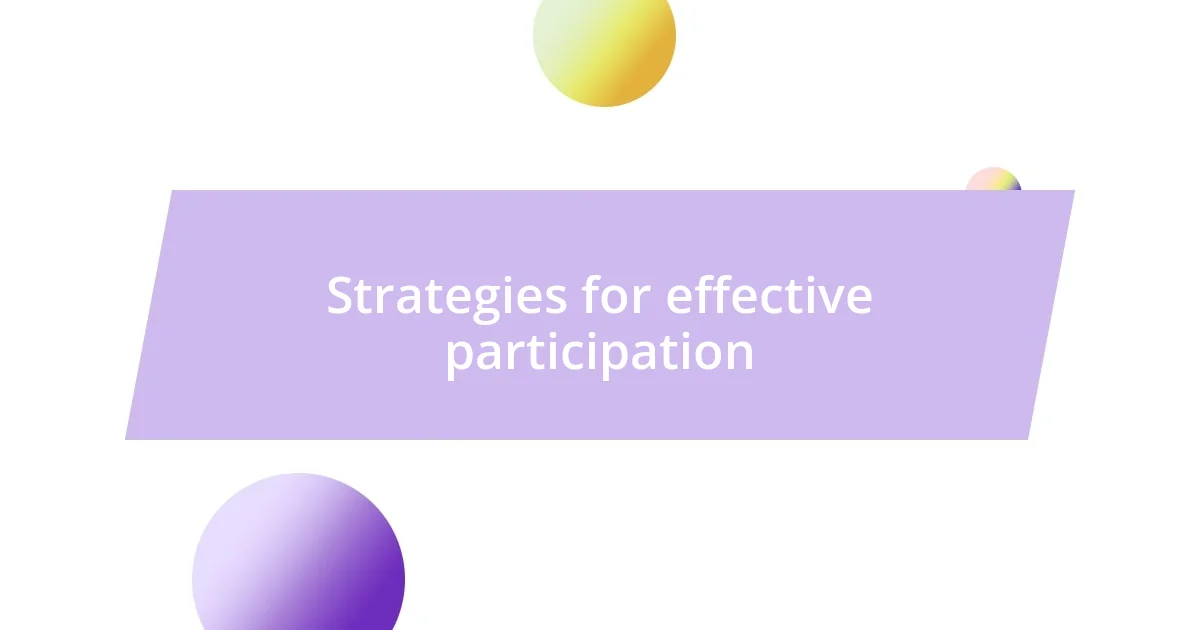
Strategies for effective participation
To participate effectively in peer support groups, I’ve learned that active listening is key. There were moments in sessions where I quietly absorbed others’ stories, sometimes tearing up at their vulnerabilities. Feeling their pain and joy helped me connect on a deeper level, and I realized that truly being present can make others feel valued. Have you ever noticed how a simple nod or a warm smile can encourage a speaker to open up even more?
Sharing your own experiences can sometimes feel like stepping onto a tightrope, uncertain of how much to reveal. I remember a session where I hesitated before opening up about a particularly tough time in my life. But once I did, the floodgates opened; the warmth and understanding I received back shocked me. Isn’t it funny how sharing our struggles not only lifts our burdens but creates bonds with others navigating similar paths? It’s like passing a torch in the dark—a bit of light that reassures you’re not alone.
Furthermore, setting goals for your participation can enhance the experience significantly. I once entered a group with the specific aim of developing my coping strategies for anxiety. By articulating my goals to the group, I found that others would help keep me accountable, sometimes even challenging me to step outside my comfort zone. How empowering is it when those around you uplift your journey? Being clear about what you seek can lead to unexpected growth and a deeper connection within the group.
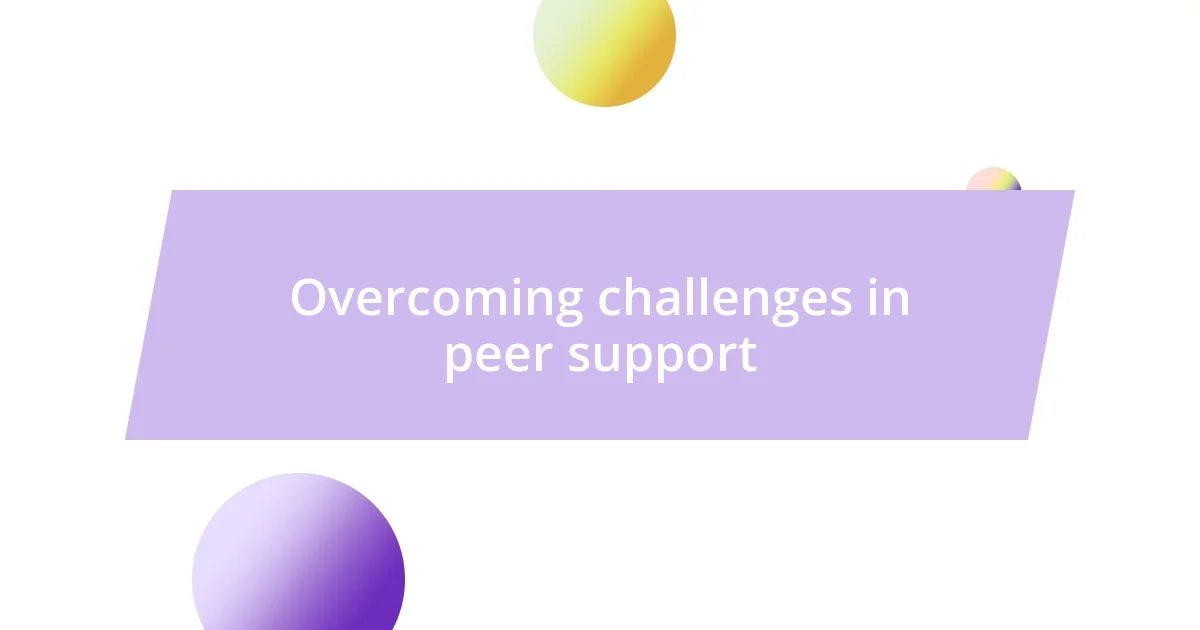
Overcoming challenges in peer support
Overcoming challenges in peer support often requires navigating complex emotions and dynamics. I remember attending a group where initially, I felt a sense of isolation amid the shared struggles. It was eye-opening to realize that the unspoken barriers, like feeling vulnerable or uncertain about sharing, affected not just me but others too. Have you ever found yourself hesitating to express your feelings, doubting whether they truly matter? This experience taught me that acknowledging these feelings within the group can create a shared understanding that breaks down those barriers.
It’s also been crucial for me to address the differences in communication styles. I recall a time when a group member’s blunt feedback left me feeling exposed and defensive. Instead of retreating, I chose to voice how their words impacted me. This sparked a conversation about empathy and listening, leading to a more supportive atmosphere. Isn’t it interesting how addressing discomfort can open up a path to deeper connections? Learning to express my needs has transformed my experience in peer support, reminding me that growth often comes from facing discomfort head-on.
Additionally, fostering trust within the group takes time and patience. One session, I opened up about a particularly sensitive issue, expecting silence or harsh judgment. Instead, the empathy I received surprised me; it was a reminder that vulnerability often invites vulnerability. How often do we underestimate the strength of honesty in building community? Embracing that moment propelled our group closer together, reinforcing the idea that sharing can pave the way for healing and stronger relationships.












